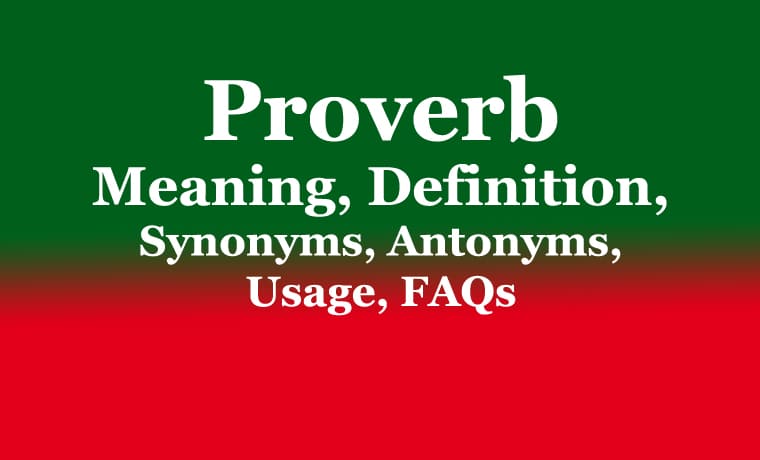Explore the world of ‘proverbs’ with our comprehensive guide. Learn the meaning of proverbs, their usage in sentences, synonyms, and antonyms. Discover why proverbs are important, their cultural significance, and how they resonate in everyday life. Perfect for anyone curious about timeless wisdom and cultural insights encapsulated in these short sayings.
Proverb
Proverb: Meaning, Usage, Forms, Synonyms, Antonyms, and Comprehensive Guide
What is a Proverb?
A ‘proverb’ is a short, well-known saying that expresses a general truth or piece of advice. Proverbs often convey wisdom and practical life lessons in a concise and memorable way. They have been passed down through generations and are used to reflect the collective experiences and cultural values of a community or society.
Example Sentence
”Actions speak louder than words” is a common proverb that means what you do is more important than what you say.”
Forms of the Word “Proverb”
Noun form: Proverb
Definition: A short, traditional saying that expresses a general truth or piece of advice. Example: “The proverb ‘A stitch in time saves nine’ emphasizes the importance of taking action early.”
Verb Form: There is no verb form of the word “proverb.” The term is used exclusively as a noun.
3. Adjective Form: There is no specific adjective form for “proverb.” However, the term “proverbial” is used to describe something that is well-known or typical, often in reference to proverbs Example: “He is the proverbial early bird, always arriving before anyone else.”
Other Forms:
Proverbially (Adverb): In a manner that relates to or is characteristic of a proverb. Example: “She was proverbially known for her punctuality.”
Synonyms for Proverb
Saying: A short, well-known phrase or expression that conveys wisdom or advice. Example: “The saying ‘Honesty is the best policy’ is another way to convey the importance of truthfulness.”
Adage: An old, wise saying that expresses a common experience or observation. Example: “The adage ‘The early bird catches the worm’ is often used to encourage punctuality.”
Maxim: A general truth or rule of conduct expressed in a concise statement. Example: “The maxim ‘Actions speak louder than words’ underscores the value of deeds over mere speech.”
Aphorism: A brief, cleverly phrased statement that expresses a general truth or principle. Example: “The aphorism ‘Time is money’ highlights the value of time in achieving success.”
Motto: A short phrase or slogan expressing a guiding principle or ideal. Example: “The motto ‘Carpe diem’ encourages people to seize the day.”
Antonyms for Proverb
Nonsense: Statements or expressions that lack sense or meaning. Example: “The idea that ‘you can always get something for nothing’ is considered nonsense.”
Fallacy: A mistaken belief or idea based on unsound reasoning. Example: “The fallacy that ‘everyone gets what they deserve’ ignores the complexities of life.”
Lie: A false statement made with the intention of deceiving. Example: “A lie contradicts the wisdom found in a proverb.” 0 0 0.
You May Like: Legacy
Essay on Proverbs
Introduction
Proverbs are integral parts of language and culture. They are short, impactful statements that convey truths or advice based on collective human experience. These sayings are cherished for their ability to encapsulate complex ideas in simple words. In this essay, we will explore the meaning of proverbs, their historical significance, different types of proverbs, and their relevance in contemporary life.
Historical Background
Proverbs have been used since ancient times across various cultures and civilizations. They are found in the oldest written records, including ancient Egyptian texts, biblical scriptures, and classical literature. The use of proverbs can be traced back to oral traditions where wisdom was passed down through generations. These sayings served as a means of educating people, preserving cultural norms, and reinforcing moral values.
Types of Proverbs
Cultural Proverbs: Each culture has its own set of proverbs that reflect its unique values and experiences. For example, Chinese proverbs often emphasize family and respect for elders, while Western proverbs may focus on individualism and self-reliance.
Universal Proverbs: Some proverbs are found across multiple cultures and languages. These proverbs often deal with fundamental human experiences, such as love, friendship, and hardship. For instance, “A penny saved is a penny earned” is a universal proverb that highlights the value of saving money.
Proverbs in Literature: Many classic works of literature incorporate proverbs to illustrate themes or character traits. For example, Shakespeare’s plays are rich with proverbs and sayings that reflect the wisdom and values of his time.
Functions of Proverbs
Educational Tool: Proverbs are used as educational tools to teach moral lessons and social norms. They provide guidance on how to behave in various situations and emphasize the importance of virtues such as honesty, patience, and diligence.
Cultural Identity: Proverbs help preserve cultural identity by reflecting the values and traditions of a community. They serve as a link between past and present, allowing individuals to connect with their heritage.
Social Commentary: Proverbs often provide commentary on societal issues and human behavior. They can critique social norms, highlight injustices, or offer insights into human nature.
Relevance in Contemporary Life
In today’s fast-paced world, proverbs continue to hold relevance. They are used in everyday conversations, literature, and media to convey wisdom and advice. The simplicity and universality of proverbs make them accessible and effective tools for communication.
In Communication: Proverbs are frequently used in speeches, presentations, and casual conversations to emphasize points or provide guidance. They add depth to discussions and can make complex ideas more relatable.
In Media and Advertising: Proverbs are often employed in advertising slogans and media content to appeal to audiences. Their familiarity and succinctness make them effective tools for capturing attention and conveying messages.
In Personal Reflection: Many people use proverbs for personal reflection and motivation. Proverbs such as “When life gives you lemons, make lemonade” inspire individuals to stay positive and resilient in the face of challenges.
Conclusion
Proverbs are a valuable aspect of language and culture. They offer insights into human nature, convey timeless wisdom, and reflect cultural values. As we navigate the complexities of modern life, proverbs continue to serve as a source of guidance and inspiration. Their enduring relevance highlights the universal truths and shared experiences that connect us all.
FAQs on Proverb
1. What is a proverb?
A proverb is a short, well-known saying that expresses a general truth or piece of advice. It is used to convey wisdom and practical life lessons in a concise and memorable way.
2. How are proverbs used in everyday life?
Proverbs are used in everyday conversations, literature, media, and personal reflections. They help convey important messages, provide guidance, and add depth to communication.
3. Can proverbs vary between cultures?
Yes, proverbs can vary between cultures. Each culture has its own set of proverbs that reflect its unique values, experiences, and traditions.
4. Are there any verb or adjective forms of the word “proverb”?
The word “proverb” is used exclusively as a noun. The adjective form is “proverbial,” which describes something that is well-known or typical. There is no verb form for “proverb.”
5. What are some synonyms for the word “proverb”?
Some synonyms for “proverb” include saying, adage, maxim, aphorism, and motto.
6. What are some antonyms for “proverb”?
Antonyms for “proverb” include nonsense, fallacy, and lie.
7. Why are proverbs important?
Proverbs are important because they convey timeless wisdom, reflect cultural values, and provide guidance on how to live a virtuous and meaningful life. They help preserve cultural identity and offer insights into human nature.
8. How can I use proverbs effectively?
To use proverbs effectively, choose ones that are relevant to the context and message you want to convey. Use them to emphasize points, provide advice, or add depth to your communication.
This extensive guide aims to provide a thorough understanding of proverbs, their significance, and their application in various aspects of life. The simplicity and universality of proverbs make them valuable tools for conveying wisdom and advice. 0 0 0
P.S. If you like the article, please don’t forget to share your thoughts. We welcome your every suggestive word.











